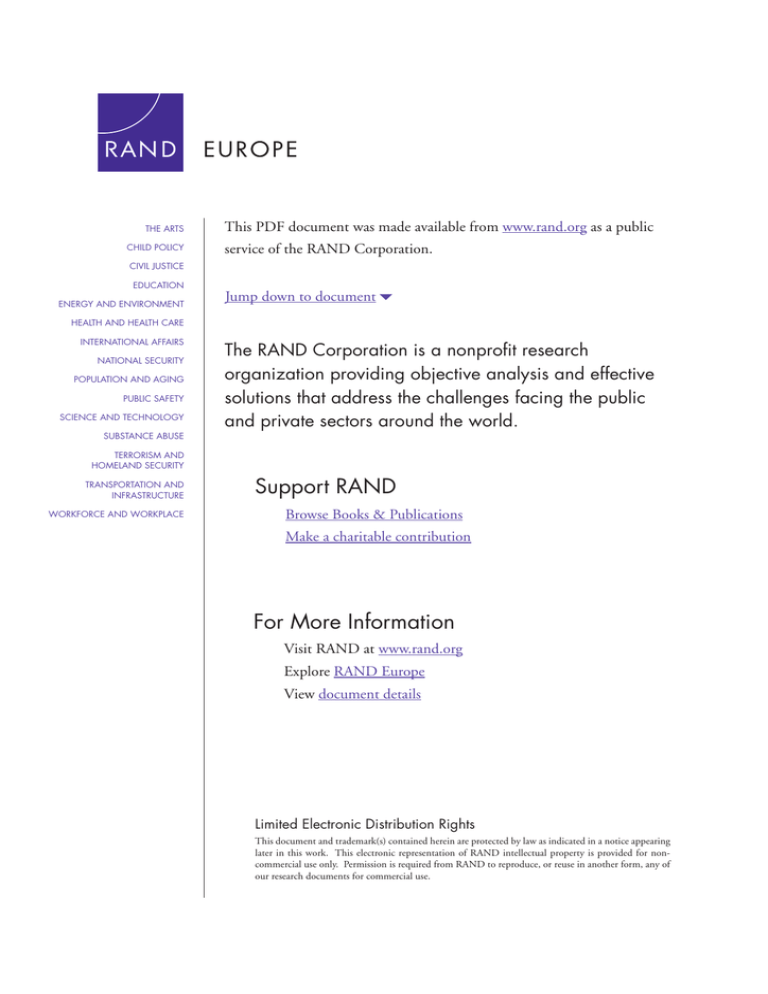
THE ARTS
CHILD POLICY
This PDF document was made available from www.rand.org as a public
service of the RAND Corporation.
CIVIL JUSTICE
EDUCATION
ENERGY AND ENVIRONMENT
Jump down to document6
HEALTH AND HEALTH CARE
INTERNATIONAL AFFAIRS
NATIONAL SECURITY
POPULATION AND AGING
PUBLIC SAFETY
SCIENCE AND TECHNOLOGY
SUBSTANCE ABUSE
The RAND Corporation is a nonprofit research
organization providing objective analysis and effective
solutions that address the challenges facing the public
and private sectors around the world.
TERRORISM AND
HOMELAND SECURITY
TRANSPORTATION AND
INFRASTRUCTURE
WORKFORCE AND WORKPLACE
Support RAND
Browse Books & Publications
Make a charitable contribution
For More Information
Visit RAND at www.rand.org
Explore RAND Europe
View document details
Limited Electronic Distribution Rights
This document and trademark(s) contained herein are protected by law as indicated in a notice appearing
later in this work. This electronic representation of RAND intellectual property is provided for noncommercial use only. Permission is required from RAND to reproduce, or reuse in another form, any of
our research documents for commercial use.
This product is part of the RAND Corporation technical report series. Reports may
include research findings on a specific topic that is limited in scope; present discussions of the methodology employed in research; provide literature reviews, survey
instruments, modeling exercises, guidelines for practitioners and research professionals, and supporting documentation; or deliver preliminary findings. All RAND
reports undergo rigorous peer review to ensure that they meet high standards for research quality and objectivity.
Responsibility in the Global
Information Society
Towards Multi-stakeholder
Governance
Jonathan Cave, Chris Marsden, Lisa Klautzer,
Ruth Levitt, Constantijn van Oranje-Nassau,
Lila Rabinovich, Neil Robinson
Prepared for British Telecommunications
The research described in this report was prepared for British Telecommunications plc.
British Telecommunications plc
Registered office: 81, Newgate Street, London EC1A 7AJ
www.bt.com
Copyright © 2007 by British Telecommunications plc. All rights reserved.
Summary
Globally active ICT companies are central to the Global Information Society. They act as:
•
network providers connecting people and institutions;
•
enablers of innovation, commerce and socio-economic development;
•
information intermediaries.
These roles bring significant responsibilities in areas such as security, privacy and
sustainability. This paper analyses:
•
the responsibilities of ICT companies – and BT in particular – in the Global
Information Society;
•
the changes that affect the responsibilities of ICT companies as a result of
converging technologies and markets;
•
the increasing difficulties of compliance with formal regulation and its
enforcement;
•
how ICT companies may act responsibly in the future.
However, the Global Information Society is also multi-stakeholder. It is composed of
relationships between ICT networks and non-ICT firms, governments, NGOs, consumers
etc., each of which participates in a variety of roles; so it is also a multilayered, complex
system.
In order to meet the challenges of the above mentioned responsibilities, a new,
multilayered, multi-stakeholder dynamic concept of responsibility is necessary. Individual
stakeholders and the sector as a whole must engage in effective, collaborative ways,
balancing the benefits of inclusiveness and consultation on one side and effectiveness in
directing and enforcement on the other. This report suggests three ‘actions’:
•
structured rebalancing;
•
cross-cutting awareness;
•
sector-specific engagement.
vii
The structural rebalancing of responsibilities is based on:
•
who can best bear it;
•
the alignment of interests;
•
effective leverage.
Such a development can only be effectively achieved if enhanced by awareness-raising
around cross-cutting issues, such as:
•
security;
•
enforcement;
•
privacy;
•
sustainability.
At the same time, thematic targeted engagement specific to each sector is required on
essential policy domains:
•
privacy;
•
communication rights;
•
digital inclusiveness;
•
security;
•
reliability.
ICT
provide
Networks
require
Global
Governance
Multistakeholder
layered
complex
Required actions
structural
rebalancing
crosscutting
Recommendations for ICT sector and BT
Figure 1 Conceptual logic
viii
sectorspecific
BT occupies a relatively unique position due to the UK ICT sector’s pre-eminence in
addressing many of these problems, and BT’s own:
•
engagement with these social issues;
•
relationships with its regulator;
•
roles as the pre-eminent incumbent (telecom network provider) in its home
market, and competitor and strategic partner of competitors across the globe.
Its diverse business and legal environment also means that BT’s own internal governance
has a strong multi-stakeholder quality. BT can thus assume a leadership role in actions to
strengthen global governance, by:
•
resolving internal coordination issues;
•
leveraging strategic power to address problems;
•
serving as a Corporate Social Responsibility exemplar and a mobiliser of multistakeholder governance;
•
finding a platform for pro-active engagement that minimises the inevitable
suspicion of ‘special pleading’.
This report recommends two specific ways in which BT can further advance its already
very active engagement as a global corporate citizen and exemplar:
•
further reinforce its sustainability operations down the supply chain in developing
countries, by extending its mainly post-contract assessment to the pre-contract
phase;
•
exercise ‘ethical leadership’ in promoting further integration of decision-making
on commercial and ‘responsibility’ strategies, and helping all stakeholders to share
in
progress
towards
advancing
the
sustainability
agenda.
ix





